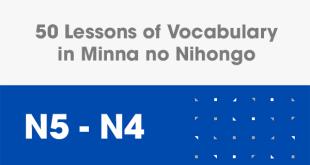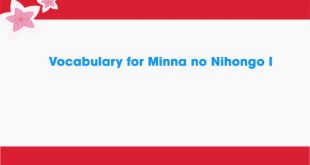Minna No Nihongo Lesson 20 Grammar
1. Historical and conventional types
Polite type:
A polite way of speaking that can be used in all contexts and for anyone, that’s why this is a common style used in everyday conversations with people without close relationships.
Used to talk to people who have just met for the first time or who are younger and not close
The predicate with the words [ます] and [です] is used in polite sentences called polite forms
Regular type:
For close friends, colleagues or family members, we will use the regular style
To use the common masses, you need to pay attention to the age and relationship of the person you are communicating because if used incorrectly, it will lead to impolite to the person you communicate with, because if you are not sure, use Safety measures are polite
2. The polite and common form of dividing
Verb
Be polite:
| . | Present, future | Past |
| Positive | かきます | かきました |
| Negative | かきません | かきませんでした |
Regular form:
| . | Present, future | Past |
| Positive | かく | かいた |
| Negative | かかない | かかなかった |
Adjective tail [い]
Be polite:
| . | Present, future | Past |
| Positive | たかいです | たかかったです |
| Negative | です | たかくなかったです |
Regular form:
| . | Present, future | Past |
| Positive | たかい | たかかった |
| Negative | たかくない | たかくなかった |
Adjective tail [な]
Be polite:
| . | Present, future | Past |
| Positive | げんきです | げんきでした |
| Negative | げんきじゃ/ では ありません | げんきじゃ / では ありませんでした |
Regular form:
| . | Present, future | Past |
| Positive | げんきだ | げんきだった |
| Negative | げんきじゃない | げんきじゃなかった |
Noun
Be polite
| . | Present, future | Past |
| Positive | あめです | あめでした |
| Negative | あめじゃ / では ありません | あめじゃ / では ありませんでした |
Regular form:
| . | Present, future | Past |
| Positive | あめだ | あめだった |
| Negative | あめじゃない | あめじゃなかった |
3. Conversations use normal style
– In the usual interrogative sentence, the adjective [か] at the end of the sentence is often omitted, and the word at the end is pronounced with a higher pitch
For example :
こーひーをのむ?
Drink coffee?
うん、のむ。
To drink
– In the question noun and adjective tail [な], the word [だ] the regular form of [です] is omitted. In the affirmative sentence [だ] is omitted otherwise it will be too assertive. Sometimes adverbs are added to the end of the sentence to make the sentence nuances softer. Women often do not use [だ]
For example :
こんばん ひま?
Are you free tonight?
うん、ひま/ ひまだ / ひまだよ。
Yes, I’m free (Used for men)
うん、ひま / ひまだよ。
Yes, I’m free (for women)
ううん、ひまじゃない。
No, I’m not free (for men and women)
– In ordinary sentences auxiliary words are sometimes omitted if the meaning is well understood in the context
For example :
ごはん「を」たべる?
Eat rice?
あしたきょうと「へ」いかない?
Are you going to Kyoto tomorrow?
このりんご「は」おいしいね。
This apple is delicious!
そこにはさみ「が」ある?
Is there a pair of scissors?
The adjectives [で],[に],[から],[まで],[と] are not omitted because they will make sentences that are not clear
4. けど
[け ど] has the same meaning as [が] but is used in ordinary conversation
For example :
そのカレーライス「は」おいしい?
Is that curry delicious?
うん、ちょっとからいけど、おいしい。
Yes, a bit spicy but delicious.
すもうのちけっとがあるけど、いっしょにいかない?
Do I have a ticket to see Sumo, come with me?
いいね!
Alright!
Related Post: Minna No Nihongo Lesson 20 Vocabulary
 Learn Japanese Free Learn Japanese Free
Learn Japanese Free Learn Japanese Free







